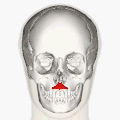| Depressor septi nasi | |
|---|---|
 Muscles of the head, face, and neck. | |
| Details | |
| Origin | incisive fossa of the maxilla |
| Insertion | nasal septum and back part of the alar part of nasalis muscle |
| Nerve | buccal branch of the facial nerve |
| Actions | depresses nasal septum, constricts nostril, moves apex of nose during movement of upper lip (e.g. talking) |
| Identifiers | |
| Latin | musculus depressor septi nasi |
| TA98 | A04.1.03.012 |
| TA2 | 2065 |
| FMA | 46777 |
| Anatomical terms of muscle | |
The depressor septi nasi muscle (or depressor alae nasi muscle) is a muscle of the face. It connects the incisive fossa of the maxilla and the orbicularis oris muscle to the nasal septum of the nose. It draws the ala of the nose downwards, reducing the size of the nostrils.
Structure
The depressor septi nasi muscle arises from the incisive foramen of the maxilla.[1] It may also partially originate from the orbicularis oris muscle.[1] Its fibers ascend to be inserted into the nasal septum[1] and back part of the alar part of nasalis muscle.
It lies between the mucous membrane and the muscular structure of the lip.
Function
The depressor septi is a direct antagonist of the other muscles of the nose, drawing the ala of the nose downward, constricting the nostrils.
It works like the alar part of the nasalis muscle.
Clinical significance
During rhinoplasty, repositioning of the head of the depressor septi nasi muscle ensures normal nose position after surgery.[2] Various approaches may be used, with similar results.[1]
Additional images
 Position of depressor septi nasi muscle (shown in red).
Position of depressor septi nasi muscle (shown in red).
References
- 1 2 3 4 Sinno, Sammy; Chang, Jessica B.; Saadeh, Pierre B.; Lee, Michael R. (May 2015). "Anatomy and Surgical Treatment of the Depressor Septi Nasi Muscle: A Systematic Review". Plastic and Reconstructive Surgery. 135 (5): 838e–848e. doi:10.1097/PRS.0000000000001169. ISSN 0032-1052. PMID 25919266. S2CID 20984532.
- ↑ Rohrich, R J; Huynh, B; Muzaffar, A R; Adams, W P; Robinson, J B (1 January 2000). "Importance of the depressor septi nasi muscle in rhinoplasty: anatomic study and clinical application". Plastic and Reconstructive Surgery. 105 (1): 376–83, discussion 384–8. doi:10.1097/00006534-200001000-00059. ISSN 1529-4242. PMID 10627007.
![]() This article incorporates text in the public domain from page 382 of the 20th edition of Gray's Anatomy (1918)
This article incorporates text in the public domain from page 382 of the 20th edition of Gray's Anatomy (1918)